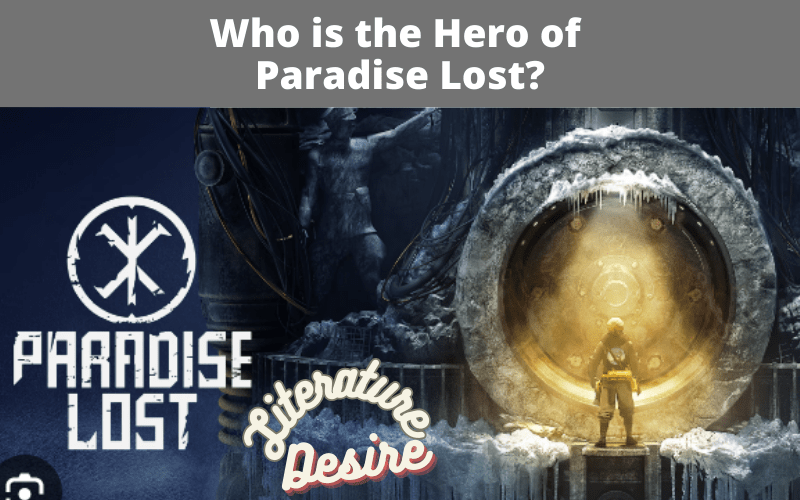Paradise Lost, the timeless masterpiece penned by John Milton, has captivated readers for centuries. As one delves into the depths of this epic poem, an intriguing question often arises: “Who is the hero of Paradise Lost?”
This query has sparked countless debates and interpretations among scholars, literary enthusiasts, and curious minds alike. In this article, we will embark on a journey to unravel the enigma surrounding the hero of Paradise Lost, exploring various perspectives and shedding light on Milton’s intentions.
Advertisement
Who is the Hero of Paradise Lost?
To comprehend the hero of Paradise Lost, we must first delve into the essence of this literary work. This long narrative of John Milton circles around the biblical story of Adam and Eve’s fall from grace, portraying their exclusion from the Garden of Eden due to their disobedience to God.
Advertisement
While Adam and Eve play important roles in the narrative, they are not traditionally considered the heroes of the poem. Instead, a multifaceted character takes center stage: Satan.
Advertisement
Satan: The Unconventional Hero?
Contrary to conventional notions of heroism, Milton portrays Satan as a compelling and central figure in Paradise Lost. Through vivid and eloquent descriptions, Milton humanizes Satan, endowing him with charisma and persuasive rhetoric. Satan’s ambitious quest for revenge against God for his own banishment lends him a tragic allure that captivates readers.
Advertisement
Satan’s excellent and extraordinary qualities, such as his resilience, willpower and determination, and leadership, make him an appealing protagonist.
His disobedient and stubborn spirit and expressiveness elevate him to a figure of admiration, even though his actions are characteristically evil. Thus, while Satan may not align with the traditional definition of a hero, he undeniably possesses heroic attributes that challenge readers’ perceptions.
Satan: The Unexpected Hero
Satan, also known as Lucifer, is a projecting character in Paradise Lost. He is revealed as a fallen angel who rebels against God and leads a revolt in Heaven.
Although Satan is conventionally seen as the antagonist, in Book 1, he appears as a complex and captivating character, just about taking on the role of the hero.
Satan’s Charismatic Appeal
In Book 1, Satan exhibits charismatic qualities that draw readers to him. His persuasive rhetoric, determination, and refusal to submit to authority make him a compelling figure.
Milton portrays Satan as a tragic hero, evoking sympathy despite his wicked intentions.
Satan’s Quest for Freedom: Who is the Hero of Paradise Lost?
Satan’s primary motive in Paradise Lost is to rebel against God and establish his own kingdom. He desires freedom from God’s rule and seeks to prove his superiority.
This quest for independence and self-determination aligns with the heroic archetype.
Satan’s Resourcefulness and Courage
Throughout Book 1, Satan demonstrates resourcefulness and courage. He navigates through the chaos and faces daunting challenges, displaying qualities traditionally associated with heroes.
Satan’s resilience and determination make him a strong contender for the role of the hero in Paradise Lost Book 1.
Other Significant Characters
While Satan emerges as a strong contender, it is essential to examine the roles of other characters in Book 1 of Paradise Lost.
God: The Divine Authority
God, the omnipotent and omniscient figure, plays a pivotal role in Book 1. He represents divine authority and righteousness.
Although God is not the central focus of the book, His actions, and decisions shape the narrative and influence the other characters.
The Human Protagonists, Adam and Eve: Flawed but Redeemable
Although Adam and Eve’s actions lead to humanity’s fall, they are pivotal characters in Paradise Lost.
Adam represents the archetypal human, flawed but capable of redemption, while Eve symbolizes temptation and the inherent curiosity of mankind.
While they may not embody conventional heroism, their journey of self-discovery, remorse, and eventual redemption resonates deeply with readers.
Adam and Eve’s ability for growth and their inclination to accept responsibility for their actions endear them to readers. Milton paints a nuanced portrait of human nature, highlighting our susceptibility to temptation and the arduous path to redemption.
In this sense, Adam and Eve become significant figures, representing the essential flaws and potential for growth within all of us.
The Bottom Line: Who is the Hero of Paradise Lost?
The question of who truly embodies the heroism in Paradise Lost is a subject of endless contemplation.
While Satan possesses captivating qualities that challenge traditional notions of heroism, Adam and Eve’s journey of redemption and their representation of flawed humanity are equally significant.
Milton intricately weaves together these characters, exploring themes of temptation, rebellion, and the human condition.
As readers venture through the mesmerizing pages of Paradise Lost, they encounter a tapestry of characters whose actions and motivations provoke introspection and philosophical musings.
Milton’s profound work transcends time, leaving us with timeless questions about the nature of heroism, the consequences of our choices, and the ever-present struggle between good and evil.
Frequently Asked Questions
Yes, Paradise Lost is deeply rooted in religious themes and explores biblical narratives. It delves into theological concepts such as free will, sin, and redemption.
Milton’s portrayal of Satan as a central character serves various purposes. It adds complexity to the narrative, explores the themes of rebellion and temptation, and allows for a profound exploration of human nature and the consequences of our actions.
While Satan embodies evil and rebellion, Milton imbues him with certain qualities that captivate readers. His resilience, charisma, and eloquence make him an intriguing character, challenging traditional notions of heroism.
Adam and Eve represent humanity in Paradise Lost. Their fall from grace serves as a cautionary tale, highlighting the consequences of disobedience and the potential for redemption and personal growth.
Yes, Paradise Lost is open to multiple interpretations due to its rich symbolism and complex characters. Different readers may emphasize different aspects of the poem, leading to diverse understandings of its themes and messages.
Paradise Lost has left a permanent mark on literature and endures to inspire writers and artists to this day. Its investigation of profound themes, complex characters, and beautiful prose cements its status as a masterpiece.
Although Satan is not traditionally viewed as a hero, in Book 1 of Paradise Lost, he exhibits heroic qualities such as determination, resourcefulness, and charisma, making him a compelling character.
Satan is portrayed as a tragic hero in Paradise Lost because he possesses qualities such as ambition, pride, and a quest for freedom. Despite his wicked intentions, readers may sympathize with him due to his complex nature.
Satan challenges the divine authority in Paradise Lost by leading a rebellion against God and seeking to establish his own kingdom. His defiance and refusal to submit to God’s rule highlight his rebellion.
Yes, God plays a significant role in Paradise Lost Book 1. He represents divine authority and righteousness, shaping the narrative and influencing the actions of other characters.
While Satan emerges as a strong contender for the role of the hero in Paradise Lost Book 1, it is important to note that the concept of a traditional hero is complex in this context. The poem explores the fallibility and complexity of its characters.

